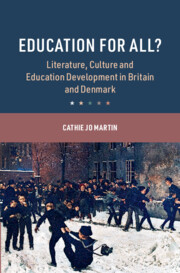Book contents
- Education for All?
- Cambridge Studies in the Comparative Politics of Education
- Education for All?
- Copyright page
- Dedication
- Contents
- Figures
- Tables
- Acknowledgments
- Note on the Text
- Introduction
- 1 Culture and the Politics of Comparative Education Policy
- 2 Culture and Continuity through Institutional Change
- 3 Romancing the Nation: Education and Nation-Building in 1800
- 4 Expanding Educational Access in the Age of Social Realism
- 5 Education in the Age of Empire, Globalization and Technological Change
- 6 Cultural Echoes of the Past in Contemporary Education Reforms
- Bibliography
- Index
3 - Romancing the Nation: Education and Nation-Building in 1800
Published online by Cambridge University Press: 27 September 2023
- Education for All?
- Cambridge Studies in the Comparative Politics of Education
- Education for All?
- Copyright page
- Dedication
- Contents
- Figures
- Tables
- Acknowledgments
- Note on the Text
- Introduction
- 1 Culture and the Politics of Comparative Education Policy
- 2 Culture and Continuity through Institutional Change
- 3 Romancing the Nation: Education and Nation-Building in 1800
- 4 Expanding Educational Access in the Age of Social Realism
- 5 Education in the Age of Empire, Globalization and Technological Change
- 6 Cultural Echoes of the Past in Contemporary Education Reforms
- Bibliography
- Index
Summary
In 1814, Denmark created a public primary school system, but Britain only developed private church schools. This chapter recounts the struggles over education in the decades surrounding 1800 and the role of authors in these battles. Writers’ literary tropes fostered distinctive perceptions of education in the two countries: Danish enlightenment writers portrayed education for workers as necessary for building a strong society, vibrant economy, and secure state. Many British authors worried that mass schooling would foster instability and overpopulation. But in both countries, some writers participated as activists in the campaigns for education. In Britain, Samuel Taylor Coleridge’s 1808 lecture on education was credited with launching the mass education movement. Coleridge, William Wordsworth Sarah Trimmer, Hannah More, and others resisted a national education system and promoted the Bell monitorial model (espoused by the Anglican National Society for Promoting the Education of the Poor. In Denmark, Ludvig Holberg bequeathed his fortune to the Sorø Academy (which educated future political statesmen) and encouraged the school to adopt his enlightened ideas about education. Later Danish Romantic writers helped a progressive coalition supporting the crown prince to advance mass schooling and to resist challenges from reactionary estate owners.
Keywords
- Type
- Chapter
- Information
- Education for All?Literature, Culture and Education Development in Britain and Denmark, pp. 78 - 112Publisher: Cambridge University PressPrint publication year: 2023

